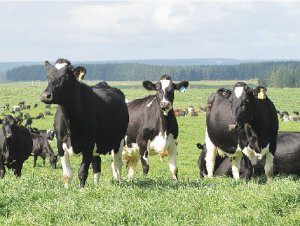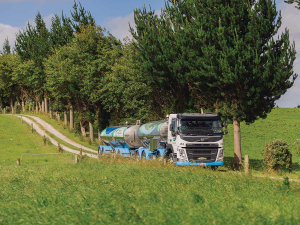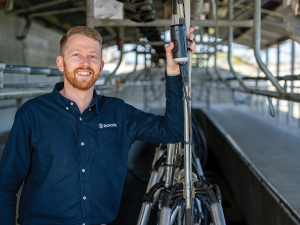“Twenty five years ago the average farm size would be 200 cows,” Kelly told the Federated Farmers annual dairy conference. “And if farm owners didn’t know their cows by name, they would know them by characteristics and when something unusual happened that cow would be taken out and checked.
“Fast forward to today and the average herd size is 900 cows and there’s no way that farm manager can appreciate or understand every cow. So bigger herds have tended to decline in productivity when measured against smaller herds.
“Part of the reason is farmers have lost the ability to pick out these cows…. So what we [at Landcorp] try to do is get back to individual cow measurement in these large herds. Some of our cows in January in these 1000 cow herds were milking at half the volume of their cohorts – that’s half the volume.
“With a 1000 cow herd you would never pick it up, probably with a 400 cow herd you wouldn’t either.”
With the new technology which enables Landcorp farm business managers to dial into a daily dashboard of data including daily individual milk solids and somatic cell counts “you pick it up, you cull it... chop its head off or dry it off, whatever… more feed for the smaller number of cows, so what happens is your milk production goes up.
“Similarly with mastitis cows…. So it gets back to these individual measurements again.
“ I think that is the trick... making these larger herds become more efficient. You are able to get this individual measurement back which we have lost over the years. That’s my theory.”
Kelly says his farm business managers spend a lot of time using this farm dashboard.
“I can be in my office, dial up a farm on a daily basis and measure milk solids, costs, daily, monthly cumulative milk solids, somatic cell count, and different feed being consumed….”
This is among reasons Landcorp plans to have commercial speed broadband on all its farms by the end of the year. “If you can’t measure you can’t manage.”
If they haven’t got line of sight from a telco tower they will have to use a solar repeater, or for more remote sites a more expensive solar repeater to pole with antenna and and underground cable. But the average capital cost per farm is just $2200.
Kelly says Landcorp has 50,000 dairy cows – that will be more if it runs Crafar farms. Its operating revenue in 2010-11 was $210m split about 50/50 deer and dairy and 50/50 beef and sheep. About eight years ago 85% of that revenue would have been sheep and beef. The state owned enterprise has spent a lot of money since that time converting land to dairy. They did not buy into dairy, but changed land use while retaining sheep and beef numbers.
They run their farms in clusters. “Fonterra is about 55% of our milk, Westland is 20 % and the others a split between Synlait and Open Country,” Kelly says.
On 14,500ha this year Landcorp produced 13.3million kgMS – milk solids per hectare is 921 “which is only average”, he says. Farms were still under development and a lot of land was sub-optimal pumice land so they spent a lot of money on fertiliser and grasses.
“We have about 135 staff in our dairy industry with head office, farm business managers, farm staff – we are not regarded as paying top of the range. We are sitting around the middle so a lot of our people leave Landcorp because we are not paying enough, go to private people and come back in a couple of years.”
The farm business managers manage clusters of farms with about 5000 cows. “Think of those as a single herd milked on five or six platforms. So I regard these people as running small to medium businesses.
“The clusters are a $100m enterprise – 25-30 staff maybe more. Many of these people will be tertiary qualified, certainly with a diploma or a degree. It is all about knowledge, skills and attitude.
“These guys need to be really smart in terms of computer work with emotional IQ, that’s the sort of soft side of farming because, as you well know, a key for farm management is to keep staff working well and motivated.”
















